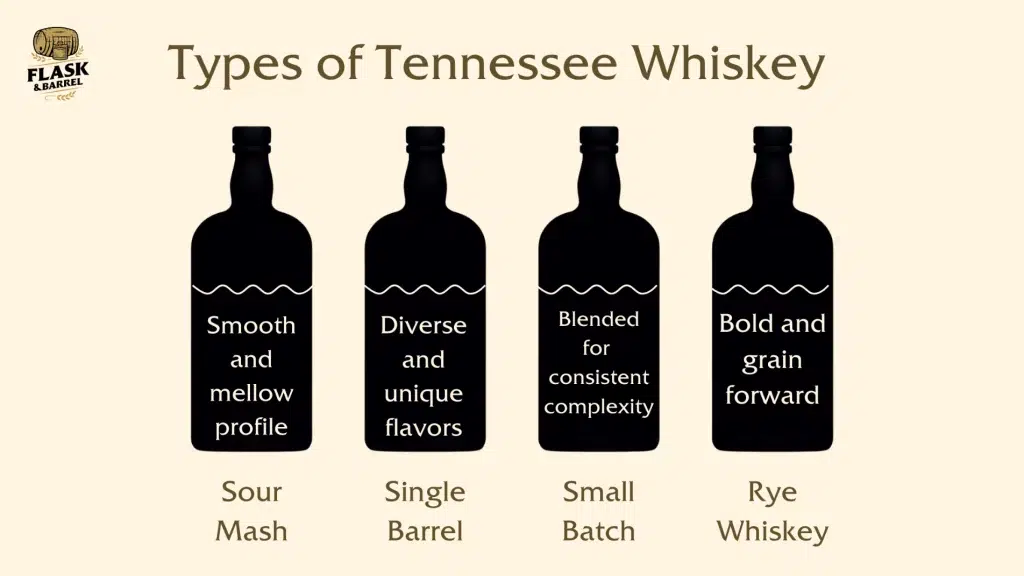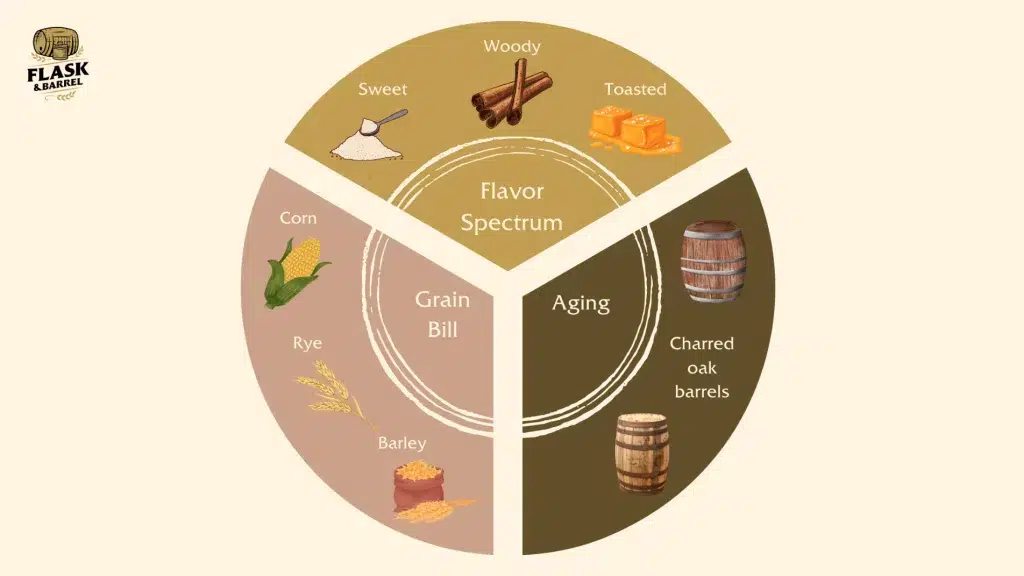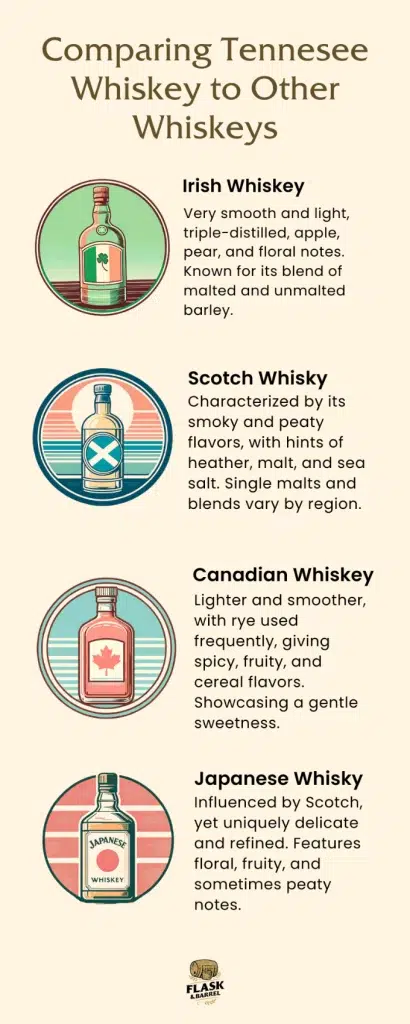Tennessee whiskey is often overshadowed by bourbon but it’s a hidden American gem with fans worldwide. Its smooth character comes from the unique Lincoln County Process. This spirit embodies rich history dating back to the late 18th century. It’s more than a drink; it’s a cultural staple that enhances cocktails and pairs well with diverse cuisines. Let’s dive into the distinctive styles and flavors of Tennessee whiskey that make it truly special.
Types of Tennessee Whiskey
Tennessee Whiskey encompasses a variety of styles, each with its own character and appeal. The Tennessee Sour Mash is perhaps the most recognizable, known for its smooth and mellow flavor profile derived from a specific fermentation process. Single Barrel selections offer whiskey lovers a chance to experience the unique characteristics of a single cask, highlighting the diversity within a distillery’s warehouses.

Small Batch whiskies, on the other hand, are crafted by blending select barrels, ensuring a consistent yet complex flavor. For those seeking a spicier kick, Tennessee Rye Whiskey introduces a bold, grain-forward option, expanding the traditional boundaries of Tennessee Whiskey flavors. Each type represents a facet of Tennessee’s rich whiskey tradition, catering to a range of palates and preferences.
Distinct Characteristics of Tennessee Whiskey
Tennessee Whiskey is distinguished by its unique production process and flavor profile. Central to its identity is the Lincoln County Process, where the spirit is filtered through charcoal before aging, imparting a smoothness that is unmistakably Tennessee. The grain bill, predominantly corn, lends a sweet foundation, while aging in charred oak barrels contributes to its rich amber color and layers of vanilla, caramel, and wood notes.
This combination of processes ensures a distinct taste that sets Tennessee Whiskey apart from other spirits. Its versatility in flavor makes it not only a favorite among connoisseurs but also an excellent base for a wide range of cocktails.

The Rich Flavor Spectrum of Tennessee Whiskey
Tennessee Whiskey offers a diverse palette of flavors that you can fully appreciate by learning the whiskey tasting process. This spectrum is broadened by the inclusion of rye-based whiskies, introducing a spicy complexity. Each expression, whether it be a Single Barrel or Small Batch, presents a unique tasting experience, marked by a signature smoothness from the Lincoln County Process.
Influence of Grain Bill on Flavor
The grain bill in Tennessee Whiskey, heavily skewed towards corn, is the backbone of its flavor profile, imparting a natural sweetness. The addition of rye or barley may introduce spicy or nutty undertones, respectively, creating a layered complexity in the whiskey. This careful selection of grains ensures a rich, multifaceted taste that is both distinctive and appealing.
The Role of Aging in Flavor Development
Aging plays a pivotal role in the development of Tennessee Whiskey’s flavor. The interaction between the whiskey and the charred oak barrels over time introduces a range of flavors, from vanilla and caramel to oak and toast. The length of aging not only deepens the whiskey’s color but also enriches its taste profile, adding layers of complexity that are savored by whiskey enthusiasts.
Pairing Tennessee Whiskey with Food
Pairing Tennessee Whiskey with food elevates both the culinary and tasting experience, creating harmonious combinations that highlight the whiskey’s rich flavor spectrum. The natural sweetness of Tennessee Whiskey, characterized by notes of vanilla and caramel, complements the savory richness of grilled meats or barbecue. Spicy rye expressions, with their bold, peppery undertones, pair exceptionally well with hearty, robust dishes like stew or spicy cuisine, offering a delightful contrast.
For dessert, the smooth, mellow flavors of a classic Tennessee Sour Mash can enhance the sweetness of chocolate or caramel-based treats, creating a balanced and indulgent finish to any meal.

Which Tennessee Whiskey Should You Try First?
Selecting your first Tennessee Whiskey involves considering your flavor preferences and the experience you seek. For those new to whiskey, a Tennessee Sour Mash with its gentle, smooth flavors, serves as an excellent introduction. Enthusiasts looking for something more robust might lean towards a Single Barrel selection, known for its bold, spicy notes.
When it comes to tasting Tennessee Whiskey, if your palate favors the sweeter side, a Small Batch Tennessee Whiskey, offering rich, caramel, and vanilla nuances, would be an ideal choice. This approach ensures that your foray into Tennessee Whiskey is both enjoyable and aligned with your taste preferences.

For Those Seeking Gentle, Smooth Flavors
Individuals inclined towards subtle and mellow tastes should explore Tennessee Sour Mash Whiskey. Its smoothness and light character, featuring hints of corn and a slight sweetness, make it an approachable choice for newcomers or those who appreciate understated elegance in their whiskey.
For Enthusiasts of Bold, Spicy Notes
For those who prefer their whiskey with a kick, Tennessee Rye Whiskey stands out. This variant, rich in rye, delivers a bold, spicy flavor that invigorates the palate. Its peppery notes and complex character cater to aficionados seeking intensity and depth in their sipping experience.
For Lovers of Sweet, Rich Profiles
Small Batch Tennessee Whiskey is the go-to for those enchanted by sweet, rich flavors. Crafted from select barrels, these whiskies offer a harmonious blend of vanilla, caramel, and oak. The intricate balance of sweetness and richness in these expressions appeals to those who savor indulgent, flavorful profiles.
Regulation Requirements Of Tennessee Whiskey
Tennessee Whiskey is bound by stringent regulations that define its production and ensure its quality. Central to these requirements is the Lincoln County Process, a unique filtration method through charcoal that distinguishes Tennessee Whiskey from other types. Additionally, it must be produced in Tennessee, distilled from at least 51% corn, and aged in new, charred oak barrels.
The whiskey cannot enter the barrel at higher than 125 proof and must be bottled at a minimum of 80 proof. These criteria not only preserve the traditional craftsmanship of Tennessee Whiskey but also maintain its distinctive character and flavor profile.
History of Tennessee Whiskey
The history of Tennessee Whiskey is a rich tapestry that intertwines with the cultural and economic development of Tennessee itself. Originating in the late 18th century, it has evolved from a small-scale farmers’ practice to a globally recognized industry. Key milestones include the perfection of the Lincoln County Process in the 19th century, which is now a hallmark of the spirit’s production.
Notable distilleries, such as Jack Daniel’s, founded in 1866, have played pivotal roles in shaping the identity and reputation of Tennessee Whiskey. This history is not just about the evolution of a spirit but also about the people, traditions, and innovations that have contributed to its enduring legacy.
Key Historical Milestones and Notable Distilleries
Tennessee Whiskey’s journey is marked by significant milestones and the establishment of distilleries that have become synonymous with the spirit’s excellence. The 1866 founding of Jack Daniel’s, the oldest registered distillery in the United States, represents a pivotal moment, setting standards for quality and craftsmanship. The introduction of the Lincoln County Process, a method of charcoal filtering, has become a defining characteristic of Tennessee Whiskey, distinguishing it from other American whiskies.
Other notable distilleries, such as George Dickel, established in 1870, have also contributed to the rich heritage of Tennessee Whiskey, each adding their unique flavors and production techniques to the storied tradition. These milestones and institutions have not only shaped the identity of Tennessee Whiskey but have also cemented its place in the global spirits industry.
Comparing Tennessee Whiskey To Other Whiskeys
Tennessee Whiskey distinguishes itself from other whiskies through its unique production methods and flavor profiles. Unlike Bourbon, which shares the requirement of a predominantly corn-based mash but lacks the Lincoln County Process, Tennessee Whiskey offers a smoother, more mellow character. Compared to Canadian Whisky, which often features a lighter body and flavor, Tennessee Whiskey presents a richer taste experience.
Japanese Whisky, known for its precision and variety, contrasts with Tennessee Whiskey’s traditional and consistent flavor notes. Lastly, Scotch Whisky, with its regional variations and emphasis on malt, offers a different spectrum of flavors from the sweet and smoky to the peaty, setting it apart from the sweet, vanilla, and caramel notes typical of Tennessee Whiskey. This comparison highlights the distinctiveness of Tennessee Whiskey within the world of spirits.

Tennessee Whiskey vs Bourbon
Tennessee Whiskey and Bourbon are closely related, both requiring a mash bill predominantly made of corn. However, Tennessee Whiskey undergoes the Lincoln County Process, where it is filtered through sugar maple charcoal, imparting a distinctive smoothness and character absent in Bourbon. Additionally, while Bourbon can be produced anywhere in the United States, Tennessee Whiskey’s production is strictly confined to Tennessee.
Tennessee Whiskey vs Canadian Whisky
Canadian Whisky, often characterized by a lighter and smoother profile, diverges significantly from Tennessee Whiskey in terms of production rules, which are more lenient regarding grain usage and aging requirements. Tennessee Whiskey delivers a generally richer and more pronounced flavor, with the charcoal mellowing process lending it a unique depth not typically found in Canadian Whisky.
Tennessee Whiskey vs Japanese Whisky
Japanese Whisky is celebrated for its meticulous craftsmanship and diverse flavor profiles, which can range from light and floral to peaty and intense. In contrast, Tennessee Whiskey maintains a consistent profile of sweetness and smoothness, attributed to the charcoal filtering process that ensures its distinct mellow character. The production philosophies and cultural heritage of the two whiskies also reflect their unique origins and traditions.
Tennessee Whiskey vs Scotch Whisky
Scotch Whisky, known for its wide array of flavors influenced by the specific regions of Scotland, from heavily peated to richly sherried expressions, contrasts with Tennessee Whiskey’s more uniform character. Tennessee Whiskey is renowned for its hallmark sweetness and smoothness, derived from its corn-heavy mash bill and the Lincoln County Process. While Scotch Whisky’s flavor complexity is shaped by local environmental factors and aging processes, Tennessee Whiskey’s defining feature remains its distinctive mellowing process.

